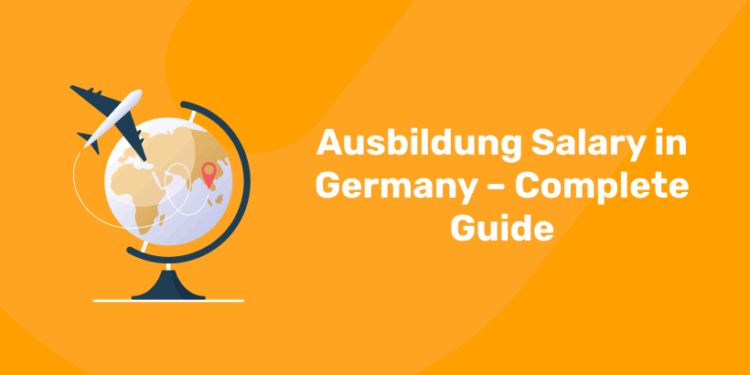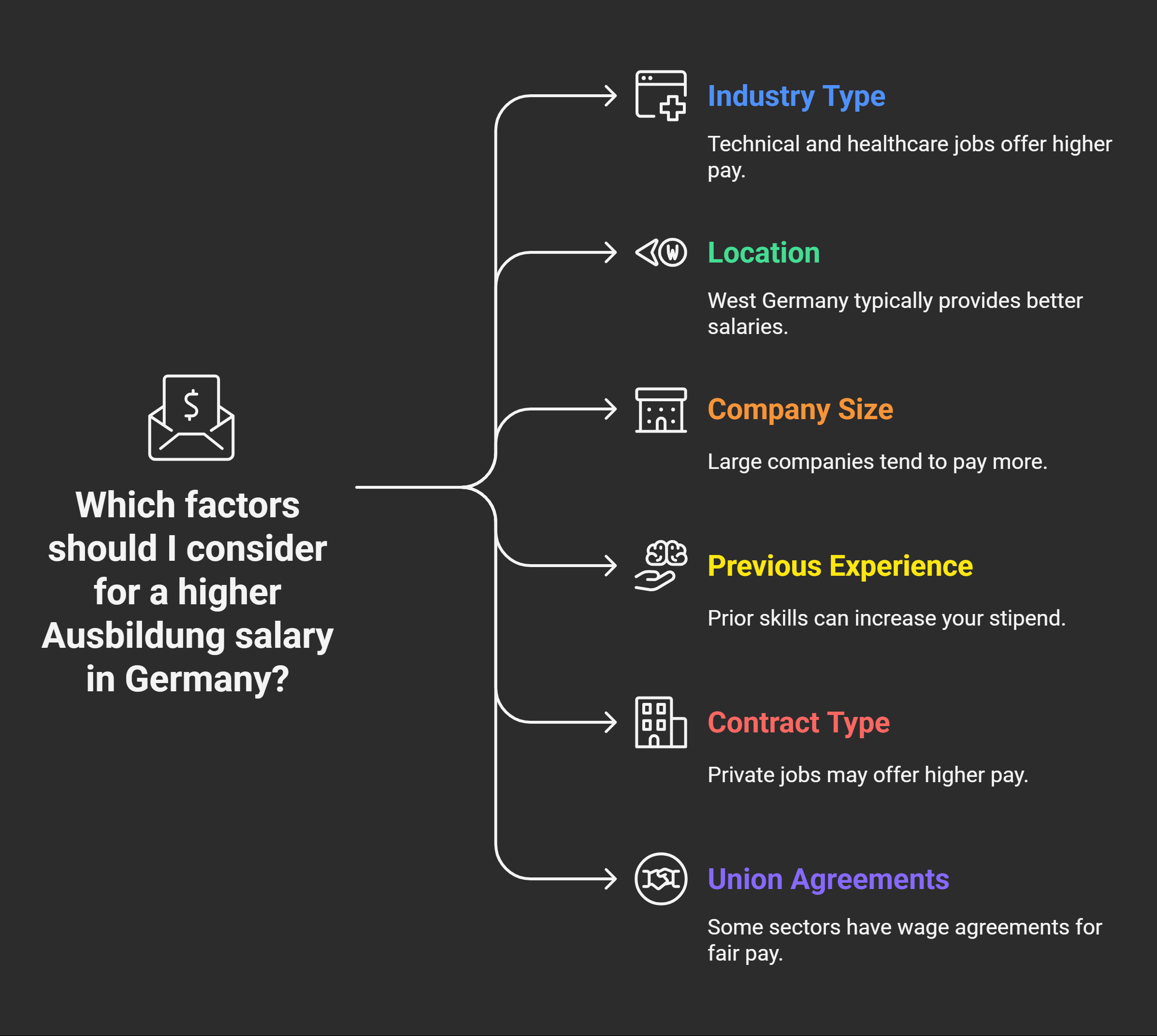Table of Contents
Many students ask about Ausbildung Salary in Germany. It is very important for planning your budget. Salary helps you manage food, rent, and travel easily. Ausbildung gives a fixed monthly pay during training. This amount is not the same for everyone. It changes with your job type and region. Knowing it early helps you plan better. Let us understand all details in simple words.
Salary during Ausbildung is different for each program. Some jobs give more money than others. Healthcare and IT jobs usually pay the best. Retail and hotel jobs pay a little less. Your pay also goes up each year. After Ausbildung, you can earn much more. Understanding this will help you choose wisely.
Key Points:
- Ausbildung Salary in Germany is between €600 and €1,200.
- Salary depends on job type and location.
- IT and healthcare jobs pay the highest.
- After Ausbildung, you can earn €2,000 to €3,500.
- West Germany usually pays more than East Germany.
- International students get the same salary as locals.
- Salary goes up every year in training.
- Best jobs include IT, nursing, and banking.
Master the German Language with Entri App! Click Here for Free Trial Class!
Introduction
Ausbildung is a vocational training program in Germany. It mixes practical work with study in vocational schools. Students learn a profession while working for real companies. This program usually lasts two to three years. Some technical programs can take up to 3.5 years.
Why Salary Information Matters?
Salary information is very important for all students. It helps in planning rent, food, and transport costs. International students need extra planning for living expenses. A clear salary idea helps avoid financial problems later.
Reasons why salary details are important:
- Helps in choosing the right Ausbildung program.
- Supports planning for living and study costs.
- Shows which programs give better financial benefits.
- Helps international students apply for the right visa.
What Will This Guide Cover?
This guide will give you complete salary details. It will show how much you earn each year. We will compare salaries in different Ausbildung programs. You will learn which programs pay the highest salary. We will explain salary growth after Ausbildung completion. International student salary and rules will also be explained.
Main points this guide includes:
- Average Ausbildung salary in Germany.
- Salary by profession and training year.
- Highest paying Ausbildung programs in Germany.
- Salary after Ausbildung completion.
- Factors that affect your pay.
- International student salary rules.
- Comparison with university salary in Germany.
What is Ausbildung in Germany?
1: How do you say "Good Morning" in German?
Quick Definition
Ausbildung is a vocational training system in Germany. It mixes practical work with classroom learning together. Students work in real companies during the program. They also attend classes at vocational training schools. This system is called the dual education system.
Key features of Ausbildung:
- Combines theory and practical training in one program.
- Students learn and work at the same time.
- They get paid during the training period.
Duration of Ausbildung
The length of Ausbildung depends on your profession.
Most programs last between two and three years.
Some technical programs can take up to 3.5 years.
Duration can reduce if you have prior experience.
Common Ausbildung durations:
| Program Type | Average Duration |
|---|---|
| Healthcare Programs | 3 years |
| IT Specialist | 3 years |
| Retail Sales | 2.5 years |
| Technical Fields | 3.5 years |
Importance for Career Building
Ausbildung is very useful for building a strong career. It gives real work experience before you finish studying. Employers prefer skilled workers with practical job knowledge. After Ausbildung, you can find jobs more easily. Many companies offer permanent roles after training ends. It is also cost-effective compared to university degrees.
Why choose Ausbildung for your career:
- You earn while learning important job skills.
- It gives you strong chances for job offers.
- No heavy fees like regular university courses.
| German A2 Exercises – Download Free PDF | ||
Free German A1 Mock Tests – Powered by AI!
Test your skills on our interactive platform. Get instant feedback from our AI to help you communicate better and track your progress. Start your free German mock test now.
Test Your German A1 for FreeHow Much Do You Earn During Ausbildung in Germany?
Average Monthly Salary
Students receive a monthly stipend during their Ausbildung. The amount depends on the job, company, and region. Most students earn between €600 and €1,200 every month. Salary increases every year as training progresses.
Key salary points:
- Pay differs for each industry and job role.
- Salaries are higher in technical and healthcare fields.
- Lower wages are common in hospitality and retail sectors.
Salary by Year of Training
Your pay grows each year during Ausbildung. First-year pay is lower compared to later years. The third year usually gives the highest stipend.
Average monthly salary by training year:
| Year of Training | Average Monthly Salary (€) |
|---|---|
| 1st Year | €600 – €900 |
| 2nd Year | €700 – €1,050 |
| 3rd Year | €800 – €1,200 |
Important Things to Know
- Salary is paid by the company every month.
- Overtime or weekend work may increase your pay.
- Extra benefits like travel allowance may be included.
- Taxes are deducted if salary crosses basic exemption.
| Goethe 2025 Exam Dates: Multiple Test Centers | |
| Trivandrum Goethe Exam Dates | Kochi Goethe Exam Dates |
| Chennai Goethe Exam Dates | Coimbatore Goethe Exam Dates |
Ausbildung Salary by Profession (Top Fields)
Overview
Salaries in Ausbildung programs depend on the chosen profession. Some fields pay more because of higher demand. Technical and healthcare jobs usually pay the highest. Hospitality and retail sectors pay the lowest.
Average Salary by Profession
Here are the most common Ausbildung fields with salary ranges. The amounts shown are per month during training.
| Profession | Average Salary (€) |
|---|---|
| Nursing (Pflegefachkraft) | €1,000 – €1,200 |
| IT Specialist (Fachinformatiker) | €1,050 – €1,200 |
| Industrial Mechanic | €1,000 – €1,100 |
| Mechatronics Technician | €950 – €1,150 |
| Electrician | €950 – €1,100 |
| Bank Clerk | €1,000 – €1,200 |
| Hotel Management | €800 – €1,000 |
| Retail Sales | €700 – €900 |
| Office Administration | €850 – €1,000 |
| Construction Worker | €950 – €1,100 |
Key Insights
- IT and healthcare programs pay the most.
- Bank and industrial roles also offer good pay.
- Retail and hotel jobs pay much lower.
- Salary can vary by location and company type.
- Some jobs include extra allowances like meals or travel.
Highest Paying Ausbildung Programs in Germany
Overview
Some Ausbildung programs offer very high salaries. These programs are mostly in technical and healthcare fields. High pay comes because of skill shortage and responsibility. Companies pay more to attract skilled trainees in these jobs.
Top 10 Highest Paying Programs
Here are the top-paying Ausbildung programs in Germany:
| Rank | Ausbildung Program | Average Salary (€) |
|---|---|---|
| 1 | Air Traffic Controller | €1,200 – €1,500 |
| 2 | IT Specialist | €1,050 – €1,200 |
| 3 | Bank Clerk | €1,000 – €1,200 |
| 4 | Nursing Professional | €1,000 – €1,200 |
| 5 | Industrial Mechanic | €1,000 – €1,100 |
| 6 | Mechatronics Technician | €950 – €1,150 |
| 7 | Electronics Technician | €950 – €1,100 |
| 8 | Insurance Clerk | €950 – €1,100 |
| 9 | Dental Technician | €900 – €1,050 |
| 10 | Freight Forwarding Agent | €900 – €1,050 |
Why These Programs Pay More
- Jobs need special skills and technical knowledge.
- There is a shortage of workers in these fields.
- Work involves big responsibility and complex tasks.
- Companies pay high to keep trained workers.
Ausbildung Salary After Completion
Overview
After completing Ausbildung, your salary increases a lot. You start working as a full-time skilled employee. The exact pay depends on your profession and location. Most jobs offer better pay than during training.
Average Starting Salary
Graduates can expect between €2,000 and €3,500 per month. Technical and healthcare jobs usually pay the highest salaries. Retail and service jobs offer lower starting pay.
Key points about post-Ausbildung salary:
- Pay is higher than the training stipend.
- Technical roles give better salary packages.
- Experienced graduates can earn much more later.
Salary Comparison: Ausbildung vs University Graduate
| Qualification Type | Average Monthly Salary (€) |
|---|---|
| Ausbildung Graduate | €2,000 – €3,500 |
| University Graduate | €3,000 – €4,500 |
Important Things to Note
- Ausbildung gives early job experience before others.
- You start earning much earlier than university students.
- Skilled workers often get permanent roles quickly.
- Extra training can further increase your salary.
Free German A1 Mock Tests – Powered by AI!
Test your skills on our interactive platform. Get instant feedback from our AI to help you communicate better and track your progress. Start your free German mock test now.
Test Your German A1 for FreeFactors Affecting Ausbildung Salary in Germany
Overview
Your Ausbildung salary can change for many reasons. It is not fixed for all students in Germany. Several factors decide how much you will earn.
Main Factors Influencing Salary
1. Industry Type
- Technical jobs pay more than retail and hospitality.
- Healthcare fields like nursing offer very high pay.
- Banking and IT sectors also provide excellent salaries.
- Creative fields like design often pay lower stipends.
2. Location
- West Germany offers higher salaries than East Germany.
- Cities like Munich, Frankfurt, and Hamburg pay more.
- Rural regions usually offer lower monthly wages.
- Cost of living is higher in top-paying cities.
3. Company Size
- Large companies can pay more than small firms.
- They also provide extra benefits like free meals.
- Smaller companies often stick to minimum legal pay.
- International brands usually offer the highest pay.
4. Previous Experience or Qualifications
- Prior job experience can increase your stipend amount.
- Related academic background can give you an advantage.
- Certifications in your field improve salary chances.
- Skilled trainees are more valuable to companies.
5. Type of Contract
- Public sector jobs usually follow fixed pay rules.
- Private companies often pay more for skilled roles.
- Apprenticeships in government firms have set pay scales.
- Some companies give bonuses and extra allowances.
6. Union Agreements
- Some sectors follow union-based salary agreements.
- These agreements ensure fair and equal pay for all.
- Unions can also negotiate higher pay for members.
- Public healthcare jobs often follow such agreements.
Ausbildung Salary for International Students
Do International Students Earn the Same?
Yes, international students earn the same as German students. Salary does not change based on nationality or origin. Companies follow standard rules for all Ausbildung trainees equally.
Key points:
- No difference between local and foreign student salaries.
- Pay depends only on industry, location, and company size.
- International trainees also receive yearly salary increments.
Visa and Work Rules
International students need a visa for Ausbildung programs. The visa allows them to work during training legally. Language requirements are usually German B1 or higher.
Important visa conditions:
- Ausbildung visa is usually valid for training duration.
- Full-time work is allowed only within training contract.
- Part-time jobs outside Ausbildung need extra permission.
Average Salary for International Students
The pay is the same as for German students. Here is an example of common Ausbildung fields:
| Profession | Average Monthly Salary (€) |
|---|---|
| Nursing | €1,000 – €1,200 |
| IT Specialist | €1,050 – €1,200 |
| Hotel Management | €800 – €1,000 |
| Retail Sales | €700 – €900 |
Tips for International Students
- Learn German for better communication and job success.
- Apply early because positions fill up very quickly.
- Check visa rules before starting your application.
- Prepare documents like certificates and language proof early.
Master the German Language with Entri App! Click Here for Free Trial Class!
Ausbildung vs University Salary in Germany
Overview
Both Ausbildung and university offer great career choices. However, they differ in salary, time, and growth. Each path has its own benefits and challenges. Here is a detailed comparison for better understanding.
Starting Salary Comparison
University graduates usually start with higher salaries. Ausbildung graduates start early but with lower pay.
| Education Path | Average Monthly Salary (€) |
|---|---|
| Ausbildung Graduate | €2,000 – €3,500 |
| University Graduate | €3,000 – €4,500 |
Time and Cost Differences
- Ausbildung lasts 2–3.5 years, with paid training.
- University usually takes 3–5 years for graduation.
- Ausbildung has no big tuition fees for students.
- Universities charge fees and require living expenses.
Work Experience and Job Entry
- Ausbildung students gain real work experience early.
- They start full-time jobs soon after completion.
- University students enter the job market much later.
- But university graduates may get higher positions quickly.
Career Growth and Future Opportunities
- Ausbildung jobs offer steady income and security.
- Growth can be slower without extra training or courses.
- University graduates can aim for top management roles.
- They may get faster promotions and higher salaries.
Which is Better for You?
- Choose Ausbildung for early income and practical skills.
- Choose university for higher long-term earnings and roles.
- Both paths can lead to successful careers with effort.
Conclusion
Ausbildung in Germany is a great career choice. It offers practical training with steady monthly income. Salary depends on profession, location, and company size. Many programs pay well, especially in healthcare and IT. International students earn the same as local students. Ausbildung also provides a secure path to permanent jobs. It is a smart option for future success.
University education offers higher salaries in the long term. But Ausbildung gives early work experience and financial stability. Both paths can lead to rewarding careers with effort. Choose based on your goals and learning preferences. Always check salary trends before deciding on a path. Plan early for better opportunities in Germany. A right choice today builds a strong tomorrow.
Free German A1 Mock Tests – Powered by AI!
Test your skills on our interactive platform. Get instant feedback from our AI to help you communicate better and track your progress. Start your free German mock test now.
Test Your German A1 for FreeFrequently Asked Questions
What is the average Ausbildung salary in Germany?
The average Ausbildung salary in Germany ranges between €600 and €1,200 per month during the training period. This amount varies depending on factors such as the industry, the specific profession, and the location of the company. For example, technical and healthcare professions usually pay more compared to hospitality or retail jobs. In most cases, the salary starts lower in the first year and gradually increases each year as you gain more experience. Additionally, some companies provide extra benefits such as travel allowances, meal vouchers, or free accommodation, which can make the overall package more attractive. After the completion of Ausbildung, the salary increases significantly, often reaching €2,000 to €3,500 per month, depending on the field.
Do international students get the same salary as Germans?
Yes, international students receive the same Ausbildung salary as German citizens. Companies are required by law to follow standard wage agreements for all trainees, regardless of their nationality. There is no discrimination in pay based on origin or citizenship status. However, international students must meet the basic eligibility criteria for joining an Ausbildung program. This includes having the necessary educational qualifications, language proficiency (usually German at B1 level), and a valid visa or residence permit for training. Good communication skills and cultural understanding can also improve job performance and future career opportunities for international students.
How does Ausbildung salary change each year of training?
Ausbildung salaries increase every year as you progress through the program. Typically, the salary in the first year is the lowest because you are just starting and learning basic skills. For example, in the first year, the average salary might be around €800 per month. In the second year, it often increases to €950, and by the third year, it could reach €1,100 or even more. This increase is designed to reward the growing skills and responsibilities of trainees as they gain more experience in their field. These increments are usually fixed by collective agreements between companies and trade unions in that industry. Some sectors, such as healthcare or IT, offer higher annual raises compared to hospitality or retail.
Which Ausbildung programs pay the highest salaries?
The highest-paying Ausbildung programs are usually in fields that require specialized skills or are in high demand. Healthcare programs, such as nursing or medical assistant roles, often pay between €1,000 and €1,200 per month during training. IT-related programs, such as IT specialists or software developers, also pay well because of the strong demand for technology professionals. Technical fields like industrial mechanics, mechatronics, and electronics offer salaries in the range of €1,000 to €1,100 per month. Banking, finance, and insurance Ausbildung programs also offer competitive pay because they require specific knowledge and precision. These programs tend to pay more because they require higher skills, have strict standards, and face labor shortages in Germany.
How much can I earn after completing Ausbildung?
After completing Ausbildung, your salary will increase significantly compared to the training period. On average, graduates can expect to earn between €2,000 and €3,500 per month, depending on the profession and experience. Healthcare professionals, such as nurses, often start with salaries around €2,500 per month, while IT specialists can earn between €3,000 and €3,500 per month. Technical jobs such as industrial mechanics also offer strong starting pay. Over time, with more experience, additional certifications, or specialized training, salaries can increase even further. Many companies also provide bonuses, overtime pay, or additional allowances, which can improve overall earnings.
Is Ausbildung salary enough to live in Germany?
Yes, Ausbildung salary is usually enough to cover basic living expenses in Germany, especially if you budget carefully. The cost of living varies by city. Smaller towns and rural areas are more affordable, so your salary will go further there. In larger cities like Munich, Hamburg, or Frankfurt, the cost of rent and food is much higher, so you may need to plan your expenses carefully. Many Ausbildung programs also provide benefits like free accommodation in company hostels, discounted meals, or travel allowances, which can help reduce living costs. Additionally, students may work part-time outside their training hours for extra income, provided it is allowed by their visa and training company.
Does Ausbildung salary vary by region in Germany?
Yes, salaries for Ausbildung programs vary significantly depending on the region in Germany. Western states like Bavaria, Baden-Württemberg, and North Rhine-Westphalia usually offer higher salaries because they have stronger economies and more industrial companies. In contrast, eastern regions such as Saxony and Thuringia often have slightly lower wages. However, it is important to note that the cost of living is also lower in these regions, which balances the difference in income. Larger cities generally offer higher salaries but also have higher living costs. Before choosing a location, it is a good idea to research both the salary levels and living expenses in that region.
Can Ausbildung students work part-time for extra income?
Yes, Ausbildung students are allowed to work part-time in addition to their training, but there are certain restrictions. First, the additional job should not interfere with your training schedule or performance. Some companies allow extra work, while others may not permit it, so it is important to check with your employer. International students must also follow visa rules regarding additional work hours. Normally, part-time work is allowed for up to a specific number of hours per week outside the training program. Many students take part-time jobs in hospitality or retail to earn extra money, especially in expensive cities.
How does Ausbildung salary compare to university graduates?
University graduates generally earn higher salaries than Ausbildung graduates. A university graduate in Germany can expect a starting salary of around €3,000 to €4,500 per month, depending on the field and experience. Ausbildung graduates, on the other hand, typically start with €2,000 to €3,500 per month after completing their program. However, Ausbildung students begin earning much earlier since they receive a monthly salary during training. University students, in contrast, often do not earn money during their studies, and they may have to pay tuition fees and living costs. This makes Ausbildung a good option for those who prefer early work experience and financial independence.
What factors affect Ausbildung salary in Germany?
Several factors influence how much an Ausbildung trainee earns. The most important factor is the profession or field of study. Jobs in healthcare, IT, and technical sectors pay more compared to retail or hospitality. Location is another major factor because salaries in western and southern Germany are usually higher than in eastern states. The size and financial strength of the training company also matter, as larger companies often pay more than small businesses. Additionally, some previous experience, specialized skills, or strong language ability can improve your chances of getting better-paying opportunities. Wage agreements and government regulations also ensure fair pay across industries.













